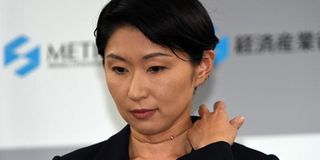Japan industry minister Yuko Obushi resigns over make-up scandal

Japan's Economy, Trade and Industry Minister Yuko Obuchi announces her resignation at a press conference in her office in Tokyo on October 20, 2014. Ms Obuchi resigned over claims she misused political funds, including to buy votes and make-up. AFP PHOTO | YOSHIKAZU TSUNO
What you need to know:
- She is the first minister to resign since Abe took power in December 2012, and her loss will be a personal blow to the premier.
- She is now facing claims that, over the five years to 2012, her political funding body spent more than $95,000 on cosmetics and accessories at a department store.
TOKYO
Japan's high-profile and telegenic industry minister on Monday resigned over claims she misused political funds, including to buy votes and make-up, dealing a blow to Prime Minister Shinzo Abe's gender reform drive.
Yuko Obuchi told a press conference carried live on multiple television channels that parliamentary business had been stalled because of questions over her spending.
"It is not permissible for me as Minister of Economy, Trade and Industry to have economy and energy policies stalled because of my own problems," she said.
"I will resign and focus on probing what has been called into question," she told reporters after a 30-minute meeting with Abe.
"As a member of the Abe cabinet... I am sorry and offer my sincere apologies for having contributed nothing to economic revival, realisation of a society in which women shine and various other tasks," she said, before bowing deeply to the sound of hundreds of camera shutters.
PERSONAL BLOW
She is the first minister to resign since Abe took power in December 2012, and her loss will be a personal blow to the premier, who has repeatedly said he wants to boost the lot of women in Japan.
Obuchi, the daughter of a former prime minister, had been tipped to become the country's first female prime minister.
Her elevation was the big news when Abe reshuffled his cabinet in September, giving a politician with little cabinet experience a powerful portfolio that includes oversight of the energy sector.
She was the most prominent of five women brought into the cabinet, a figure that ties the record for the most women in an administration.
But she is now facing claims that, over the five years to 2012, her political funding body spent more than 10 million yen ($95,000) on things unconnected to politics, including cosmetics and accessories at a department store.
Her political group also invited residents in her electoral district in central Japan on bus tours to see theatre performances in Tokyo at fees below actual cost — a move opposition lawmakers have said amounts to "vote-buying".





